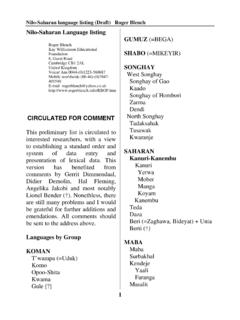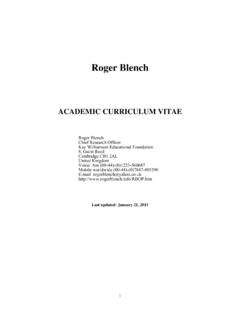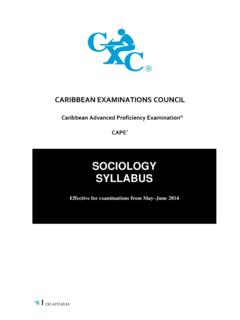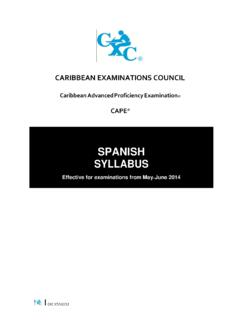Transcription of A DICTIONARY OF NIGERIAN ENGLISH - Roger Blench
1 A DICTIONARY OF NIGERIAN ENGLISH [DRAFT CIRCULATED FOR COMMENT] Roger Blench Mallam Dendo 8, Guest Road Cambridge CB1 2AL United Kingdom Voice/Answerphone/Fax. 0044-(0)1223-560687 E-mail Cambridge, Sunday, 07 August 2005 i TABLE OF CONTENTS Abbreviations ..ii Preface ..ii Introduction .. 1 1 Spelling .. 1 NIGERIAN ENGLISH /West African 1 Pidgin versus NIGERIAN ENGLISH .. 1 Auxiliaries .. 2 Student slang .. 2 Pronunciation spellings .. 2 Re-interpretation of pidgin .. 3 Style versus substance .. 3 From NE to 4 Spelling pronunciation .. 4 Missionary ENGLISH .. 4 Scientific names, and trade names .. 4 Regional variation .. 4 Phonology .. 5 Parts of 5 References .. 6 B.. 2 C.. 5 D.. 7 E.. 9 9 G.. 10 H.. 12 I.. 13 J.. 14 K.. 14 L.. 15 M.. 16 N.. 18 O.. 18 19 Q.. 22 R.. 22 S.. 23 T.. 25 U.. 27 V.. 27 W.. 27 X.. 28 Y.. 28 Z.. 28 Numbers .. 29 ii Abbreviations AE African ENGLISH Amer.
2 American (for Americanisms)arch. archaic dial. dialect et. etymologically euph. euphemism fig. figurative hum. humorous id. idiom ideo. ideophone ins. insulting joc. jocular lit. literally NE NIGERIAN ENGLISH NNE Northern NIGERIAN ENGLISH SE Standard ENGLISH SNE Southern NIGERIAN ENGLISH sc. sl. schoolboy slang st. sl. student slang TE Tropical ENGLISH Preface This DICTIONARY of NIGERIAN ENGLISH was stimulated by some enquiries from the Oxford ENGLISH DICTIONARY on words of putative West African origin.
3 The OED faces an increasingly uphill struggle in its attempts to capture World ENGLISH ; almost every Anglophone country has now developed a set of distinctive uses, some more divergent than others. It is surprising, however, that NIGERIAN ENGLISH has never been the subject of a published DICTIONARY ; rumours abound of mighty manuscripts, but these have yet to see the light of day. A recent publication by Igboanusi goes some way towards remedying this deficiency but the inclusion here of many words not in his DICTIONARY indicates how much work is still to be done. The present manuscript is a draft of a document that will eventually, I hope, become a collective product. I doubt that one individual could produce anything very comprehensive; Nigeria is too diverse and regionalised. But it seems sensible to lay down an initial marker; then additions can be made.
4 I am circulating this to individuals I know have an interest; but please send any further information, comments, emendations etc. to the email or address given on the title page. Roger Blench Cambridge Sunday, 07 August 2005 DICTIONARY of NIGERIAN ENGLISH Circulation Draft Roger Blench 1 Introduction These notes are intended to raise some issues on sources, interpretation and the definition of NIGERIAN ENGLISH . Sources1 One of the most difficult issues in lexicography is documenting usages in a semi-written language. If dictionaries of indigenous African languages are prepared they usually depend entirely on oral sources and thus no specific justification is given for entries. However, NIGERIAN ENGLISH is sometimes written, especially in newspapers and magazines, and thus has some sort of orthographic tradition. Nonetheless, many of the most picturesque expressions are strictly oral and must still be captured in the present document.
5 Although previous studies in this direction have tended to cite novels or literary works (notably Jowitt 1991) these are sometimes unrepresentative of the spoken language. I have therefore used newspaper, notices and overheard speech as sources. Example sentences not specifically sourced should be treated as based on the author s or his correspondents experiences. Spelling NIGERIAN ENGLISH is printed regularly in the newspapers and since much of it consists of using SE in extended senses spelling is generally not a problem. Some forms of pidgin origin such as done have conventional representations, don . However, others, such as rubber are pronounced in a variety of forms, such as r ba, rUba etc. depending on sociolinguistic considerations. To capture this, I have written phonologised pronunciations in square brackets after head entry.
6 Thus; leather [l da] NIGERIAN /Ghanaian/ West African ENGLISH One of the more surprising things about NIGERIAN ENGLISH is the extent to which it has a common lexicon and grammar with other West African Englishes, notably Ghanaian. A guide to Ghanaian ENGLISH (Kirby 1998) provides an interesting comparison with the present document and parallel forms are noted2. I have less information about Cameroun, Sierra Leone and Gambia and would welcome further insights. However, the puzzle is the history of some of these forms. Do they go back to the early days of colonial presence on the coast or are they more recent products of the massive migration of Ghanaians to Nigeria during the oil-boom era of the 1970s and 1980s? Probably both, but only a detailed scanning of earlier sources will provide answers. Pidgin versus NIGERIAN ENGLISH NIGERIAN ENGLISH is regarded as distinct from Pidgin ENGLISH , although the exact location of the boundary between them differs from speaker to speaker.
7 Some expressions are regarded as strictly Pidgin, for example pickin for 'child' and sabi for 'to know'. I have thought it best to be quite inclusive, but no doubt some of the entries will be questioned. 1 Thanks to Philip and Vicky Ostien and especially to Kay Williamson for many useful suggestions. 2 Prof. Mary Esther Kropp-Dakubu of Legon university has kindly gone through the draft text and marked all those entries which also have parallels in Ghanaian ENGLISH . DICTIONARY of NIGERIAN ENGLISH Circulation Draft Roger Blench 2 Auxiliaries Often the distinctiveness of NIGERIAN verbs in use consists of unusual auxiliaries applied to conventional verbs. Some of these are as follows; done he done go he went [Pidgin!] got the thing got spoiled the water got finished has he has go he went [just imperfect learning, not standard] use to he use to come here he comes here regularly [back formation from used to] Student slang Schools and universities are good but extremely localised sources of slang; Ibadan university in particular seems to have been an important source of unusual expressions.
8 Indeed a small book was published of these expressions when Ibadan was the only university (Opara & Oleghe 1956). Asomugha (1981) began life as a compendium of student slang but was enlarged to take in some more mainstream NIGERIAN ENGLISH expressions. Such expressions are often highly localised in time and place; few expressions mentioned in this book appear to be still in use. Where a term seems to be student slang I have noted it; this is a rich and distinct field. Kay Williamson ( ) has supplied a number of expressions currently (2002) in use in the university of Port Harcourt, but it is difficult to know how widespread these are. Tropical ENGLISH There are numerous terms which may be termed Tropical ENGLISH ; unknown to most speakers of SE, they are nonetheless not specific to Nigeria, but are nonetheless widely used across the Anglophone tropics. This is very common in pan-tropical plants, for example oil-palm or yam-mound.
9 I have marked these in the text as TE. Pronunciation spellings These are spellings which arise because two ENGLISH words are pronounced alike by Nigerians and the two spellings, which reflect different pronunciations for SE speakers, get confused or treated as equivalent. Most are nonce-forms, but the following examples are typical. DICTIONARY of NIGERIAN ENGLISH Circulation Draft Roger Blench 3 She feels her life to be sleeping away from her finger. SE [slIpIN] and [sli:pIN] merge as NE [slipiN] He is well vast in the Igbo proverbs. SE [v :st] and [va:st] merge as NE [vast] ..to deep his hand in the bag SE [dIp] and [di:p] merge as NE [dip] ..capable of performing impossible fits SE [fIt] and [fi:t] merge as NE [fit] She turned out to develop cold fit for the husband when the going became bad. SE [fIt] and [fi:t] merge as NE [fit] Nigerians from all works of life .. SE [w k] and [wO:k] merge as NE [wOk] Pack your car here.
10 SE [p k] and [pA:k] merge as NE [pak] laddle reflects the common NIGERIAN pronunciation [ladEl] Source: Kay Williamson Portmanteau words The portmanteau word, first introduced by Lewis Carroll as a humorous excursus of Humpty-Dumpty, is a lexical reality in Nigeria. Two sound-alikes are combined into a single form as the following examples show; impressionario is a common written form of impressario, presumably a portmanteau form impressario + impression virgina common spelling of vagina presumably by re-interpretation from virgin Re-interpretation of Pidgin An interesting process is the movement from Pidgin back into NIGERIAN ENGLISH through relexicalisation. For example; Pidgin de ting no gree boil the liquid will not boil NE the kettle did not agree to boil the kettle won t boil The pidgin expression is primary and it has been re-expressed by a speaker who sees the second formulation as more prestigious.











